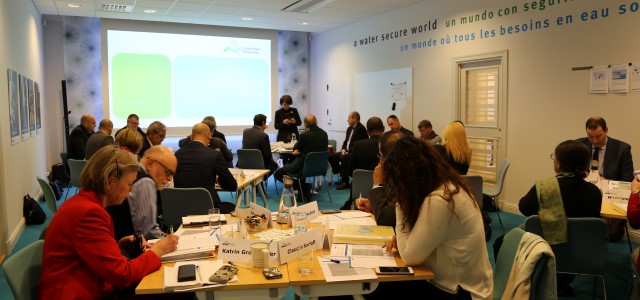The topic of water diplomacy, also referred to as ‘water and security’, was introduced by Johan Gély of the Swiss Agency for Development and Cooperation which issued a paper in September 2015 about the subject. Switzerland considers it a high priority to respond to the challenge of water as a “geopolitical resource” because it is increasingly shaping the foreign policy agenda of many countries in hot spots. According to the SDC website, demand for water is set to rise by more than 50% by 2030, thus increasing the risk of conflict. However, conflict is not inevitable and has the potential to be a trigger for peace and cooperation.
The session also included a presentation by Jerry Delli Priscoli, GWP’s Technical Committee Chair, and one by Marian Patrick of the Stockholm International Water Institute (SIWI).
Another topic that drew attention was GWP’s core mandate, that is, improving water governance by applying an integrated approach to water management. It was noted that by 2050, 45% of global GDP will be put at risk if current water management practices are not changed. Whatever other issues impinge on water resources (e.g., climate change, food insecurity, energy demand, etc.), they need to be tackled in the context of improving overall water governance.
Donor Returning
GWP was pleased to welcome to the FPG a representative of the Norwegian government which has returned as a GWP donor, signing a 3-year agreement. Earlier this year Sweden renewed its commitment to GWP by increasing its financial support and signing a 5-year agreement. “It is good to see this fresh confidence in GWP,” said Dr. Oyun Sanjaasuren, GWP Chair. “Clearly, GWP has made advances in showing its financing partners how it can leverage a multi-stakeholder partnership for improving the way water is managed.”
A discussion took place on the role of the private sector in funding. It was noted that the private sector is waking up to the risk of water scarcity and the threat that poses to their long term access to profits. This should make them keenly interested in addressing water governance, something that requires multi-stakeholder partnerships.
The SC met for the first time with Dr. Sanjaasuren as the Chair (appointed in June). The SC had in-depth discussions about the annual Network Meeting and GWP’s Change Agenda. It was noted that new modalities need to be found to get greater engagement from GWP Partners through the Network Meeting. As for the Change Agenda, a process and timetable was agreed for a robust country analysis followed by a forms and function study to lay the basis for how the Network needs to develop in the lead up to its next strategy period which begins in 2020. The SC also approved the 2017 budget of 11.7 million Euro and endorsed the 3-year work programme.

